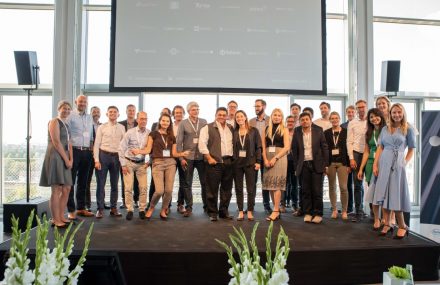There’s one person that every Munich startup in the field of digital health has definitely encountered: Dr. Jochen Hurlebaus. He’s the project leader and Head of Innovation & IP Management at Roche Diagnostics. He’s also the person who launched the Digital Health Accelerator in early 2018 together with the cooperation partners Werk1 and Plug and Play. An interview.
Jochen, in your opinion, how strong is the Munich ecosystem in the field of digital health? What makes the local eHealth scene special?
Generally speaking, Munich is still underestimated as a location for startups, even though we’ve had a very agile startup scene for years. Because it’s more active in B2B, it doesn’t get as much public attention compared to the Berlin startup scene — but in exchange, the solutions here are often very sound and unique.
“Digital Health: Munich offers an unbeatable ecosystem”
In the field of digital health, I think Munich offers an unbeatable ecosystem for startups: A lot of technology giants such as Google and Microsoft are located here, as are numerous pharmaceutical and diagnostic companies. Moreover, the Technical University of Munich (TUM) and Ludwig Maximilian University (LMU) are two internationally renowned universities that are not only pioneering in technological and medical research, but are also closely involved in funding programs for startups.

The accelerator scene has also grown rapidly: In addition to Werk1, which established the first digital health accelerator in Munich with us early this year, the world’s largest accelerator Plug and Play – our partner for the current Batch One (which now goes by the name of Startup Creasphere) – is now also present in Munich with an office with digital health as its main focus.
Last but not least, digital health is getting more attention from regional Bavarian politics. The Bavarian Ministry of Economic Affairs is setting a good example for how to improve conditions for startups in the field.
What advantages or disadvantages do digital health startups have compared to other industries?
The high demand for digital health solutions and the high degree of specialization are definite advantages: Startups that have the right idea and medical or technological know-how to offer don’t have to worry about too much competition. That being said, the path to market maturity is more lengthy and costly than in other industries; that’s why so many startups with good ideas fail due to a lack of experience in the area of regulatory requirements, or they don’t have the financial staying power that is often necessary during the approval phase.
What does an attractive business model for an eHealth startup look like?
While the direct-payer mentality is quite prevalent in many other markets, that kind of business model is rather difficult in the German healthcare system. That’s why an increasing number of startups are trying to enter into cooperation agreements with health insurance companies or to gain a foothold in occupational healthcare.
What counts is that the developed solution offers some medical and economic benefit, which means the improvement it offers a patient is in balance with the costs. If you have a health insurance company on board from the beginning, you can decide together what data needs to be collected to verify the medical and economic advantage that’s being offered.
Business models with enormous potential
What are the challenges facing the German healthcare industry and how are startups changing things?
Digitization is one of the greatest upheavals the healthcare industry has ever experienced. To successfully set the course for future healthcare, it’s important for various players of different strengths to work together. While established companies have a lot of know-how to offer that startups lack, for example in the area of regulatory requirements, it’s the startups that introduce the drive and new ideas that are necessary to develop digital solutions.
Many startups also stand out because they approach patients, doctors and other players in the healthcare industry directly to try out new solutions and business models. By doing so, they identify new niches where business models with enormous potential can mature. That kind of approach is simply not often possible for a large enterprise. With collaboration, it’s possible to develop promising ideas and technologies within a very short period of time.
That’s why from our perspective, collaboration between companies and digital startups is an important component for successfully setting the course for future healthcare, which will then drive forward personalized care for patients across the world.
“The startups’ dynamic energy has been a valuable source of inspiration”
So how do players like Roche and the Digital Health Accelerator support the industry?
There are very different approaches. As the initiator and main sponsor of the Digital Health Accelerator in Munich, it was important to us from the very beginning to offer more than just financial support, material benefits and an infrastructure.
Our main focus has been on direct communication with startups and we attached utmost importance to the concept of “co-creation.” Every startup worked with a Roche business owner on a pilot project (note from the editor: An example from Batch Zero is inveox, and one of the participants in the current batch is cosinuss). Concrete project work was the best way for us to share our knowledge about topics like market access, design, manufacturing and the validation of mobile devices. The Roche mentors were also able to give the startups a very hands-on impression of how the German diagnostics market works during joint customer visits.
From our perspective, this kind of mentoring program was a win-win for both sides: It allowed the startups to continue developing their projects, to pick up business know-how and to make new contacts in the industry. At Roche, we were fascinated by the change of perspective, and the startups’ dynamic energy has been a valuable source of inspiration.
So what’s planned now for Startup Creasphere – the health accelerator?
We’re working with Batch One right now, which includes seven international and national startups that made it through selection day in mid-September with their pitches. As was the case with Batch Zero, our focus is once again on intensive communication between startups and mentors and on co-creation: In twelve week-long programs, the startups receive not only helpful market insights and know-how, but also work directly with Roche business owners on their digital health projects and business models.

The future goal is to run two batches every year. Roche has entered into a long-term partnership with Plug and Play to do just that. We’re also open to working with additional partners and hope to be able to share more about that soon.
Thank you very much for the interview, Jochen Hurlebaus!



